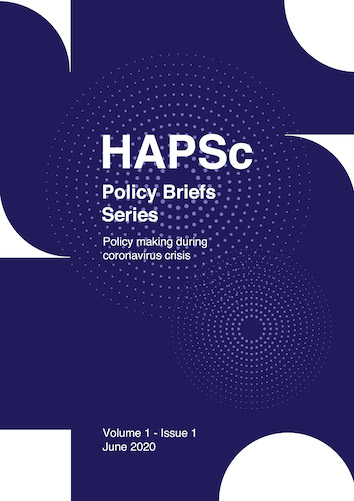Teaching EU Values in Schools through European programs during COVID-19 pandemic. The “Teachers4Europe: setting an Agora for Democratic Culture” Program
Abstract
The establishment of the European Education Area is fundamental for the development of the European Union of Values. The importance of education is the basis of active citizenship and fundamental values that should lie at the heart of the EU as stated in the Paris Declaration 2015, the EU Leaders’ Agenda at the Social Summit for Fair Jobs and Growth in Gothenburg, 2017 and the new EU strategic agenda 2019-2014. In order to achieve this goal, special attention must be paid to human resources, especially teachers, who, as the main pillars of education, are the key-actors to promote European values. This policy brief outlines the importance of teaching EU values in a digital environment due to Covid-19 pandemic era. “Teachers4Europe setting an Agora for Democratic Culture” program establishes a European network of teachers. Teachers4Europe network challenge is to become the driving force for the promotion of the EU values even in times of social distancing. A prerequisite for promoting EU values lies in the continuous training of teachers and students on issues related to the EU, the reshaping of the curricula, the enhancement of digital skills and digital literacy to advance civic competences and the participation in European programs. The flexibility of European programs offers the opportunity to teachers and students to interact with their peers and stakeholders through e-conferences, e-schools and online lessons. Through this process, effective policy proposals and good practices would emerge, while at the same time alternative forms of education will be established in cases of global crisis as the Covid 19 pandemic.
Article Details
- How to Cite
-
Asderaki, F., & Sideri, O. (2020). Teaching EU Values in Schools through European programs during COVID-19 pandemic. The “Teachers4Europe: setting an Agora for Democratic Culture” Program. HAPSc Policy Briefs Series, 1(1), 259–270. https://doi.org/10.12681/hapscpbs.24977
- Section
- Articles

This work is licensed under a Creative Commons Attribution 4.0 International License.
Authors retain copyright and grant the journal right of first publication with the work simultaneously licensed under a Creative Commons Attribution License that allows others to share the work with an acknowledgement of the work's authorship and initial publication in this journal.Downloads
Download data is not yet available.
References
Bellamy, R. (2008). Citizenship, “A Very Short Introduction”. New York: Oxford University Press.
Council Recommendation (2018a). Promoting common values, inclusive education, and the European dimension of teaching ST/9010/2018/INIT, OJ C 195, 7.6.2018.
Council Recommendation (2018b) Key competences for lifelong learning (Text with EEA relevance.) ST/9009/2018/INIT, OJ C 189, 4.6.2018
Erasmus+ KA3 “Teachers 4 Europe: Setting an Agora for Democratic Culture” (2018 - 2021). “Needs Assessment Report for Stakeholders”, Chapter 3.2: “European Values at Risk”, Page:9, edited by Leibniz University Hannover.
European Commission (2018). Communication on the Digital Education Action Plan COM/2018/022 final, 17.1.2018.
Symeonidis V. (2018). Revisiting the European teacher education area: the transformation of teacher education policies and practices in Europe. CEPS Journal 8 (3): 13- 34.



